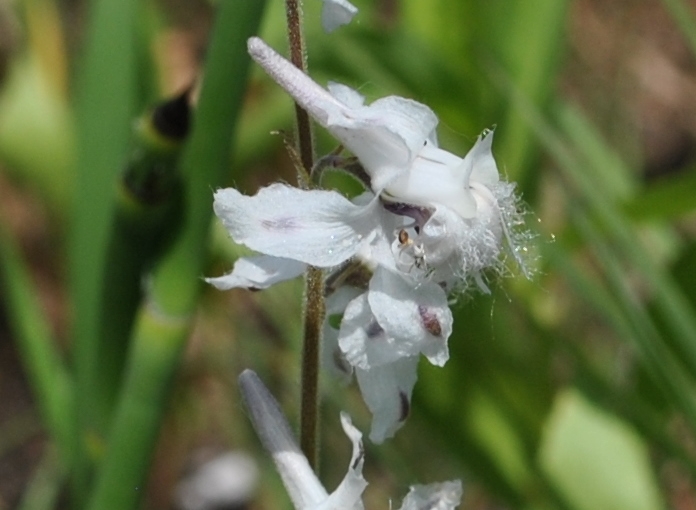Carolina Larkspur
(Delphinium carolinianum subsp. virescens)
Carolina Larkspur (Delphinium carolinianum subsp. virescens)
/
/

Aaron Carlson
CC BY-SA 2.0
Image By:
Aaron Carlson
Recorded By:
Copyright:
CC BY-SA 2.0
Copyright Notice:
Photo by: Aaron Carlson | License Type: CC BY-SA 2.0 | License URL: https://creativecommons.org/licenses/by/2.0/ | Uploader: aarongunnar | Publisher: Flickr |






















































Estimated Native Range
Summary
Delphinium carolinianum subsp. virescens, commonly known as Carolina Larkspur, is a deciduous perennial herb native to open woodlands, grasslands, and prairies across the Central and Southeastern United States. It typically grows to a height of 3-4 feet (0.9-1.2 meters) and a width of 1-2 feet (0.3-0.6 meters). The plant features tall spikes of delicate white flowers that bloom in late spring to early summer, adding vertical interest to garden beds. The flowers are particularly showy and attract pollinators such as bees and butterflies.
Carolina Larkspur is valued for its tall, elegant flower spikes and ease of maintenance. It is often used in wildflower gardens, borders, and cottage gardens. It prefers full sun to partial shade and requires well-drained soil. While it tolerates a range of soil types, it thrives in rich, loamy soils. Regular watering is important, especially during dry spells. It is not typically troubled by serious pests or diseases, but it can be susceptible to powdery mildew and crown rot if grown in poorly drained soils. It is important to note that all parts of the plant are toxic if ingested, so care should be taken if planting in areas accessible to children or pets.CC BY-SA 4.0
Carolina Larkspur is valued for its tall, elegant flower spikes and ease of maintenance. It is often used in wildflower gardens, borders, and cottage gardens. It prefers full sun to partial shade and requires well-drained soil. While it tolerates a range of soil types, it thrives in rich, loamy soils. Regular watering is important, especially during dry spells. It is not typically troubled by serious pests or diseases, but it can be susceptible to powdery mildew and crown rot if grown in poorly drained soils. It is important to note that all parts of the plant are toxic if ingested, so care should be taken if planting in areas accessible to children or pets.CC BY-SA 4.0
Plant Description
- Plant Type: Herb
- Height: 2.5-3.5 feet
- Width: 1-1.5 feet
- Growth Rate: Moderate
- Flower Color: White, Blue
- Flowering Season: Spring, Summer
- Leaf Retention: Deciduous
Growth Requirements
- Sun: Full Sun, Part Shade
- Water: Medium
- Drainage: Medium, Fast
Common Uses
Bee Garden, Bird Garden, Butterfly Garden, Deer Resistant, Hummingbird Garden, Low Maintenance, Rabbit Resistant, Showy Flowers
Natural Habitat
Native to open woodlands, grasslands, and prairies across the Central and Southeastern United States
Other Names
Common Names: Penard’s Larkspur, Plains Larkspur, White Larkspur
Scientific Names: , Delphinium carolinianum subsp. virescens, Delphinium virescens, Delphinium carolinianum subsp. penardii, Delphinium penardi, Delphinium virescens var. penardii, Delphinium virescens var. macroceratilis, Delphinium albescens, Delphinium virescens subsp. penardii, Delphinium camporum
GBIF Accepted Name: Delphinium carolinianum subsp. virescens (Nutt.) R.E.Brooks